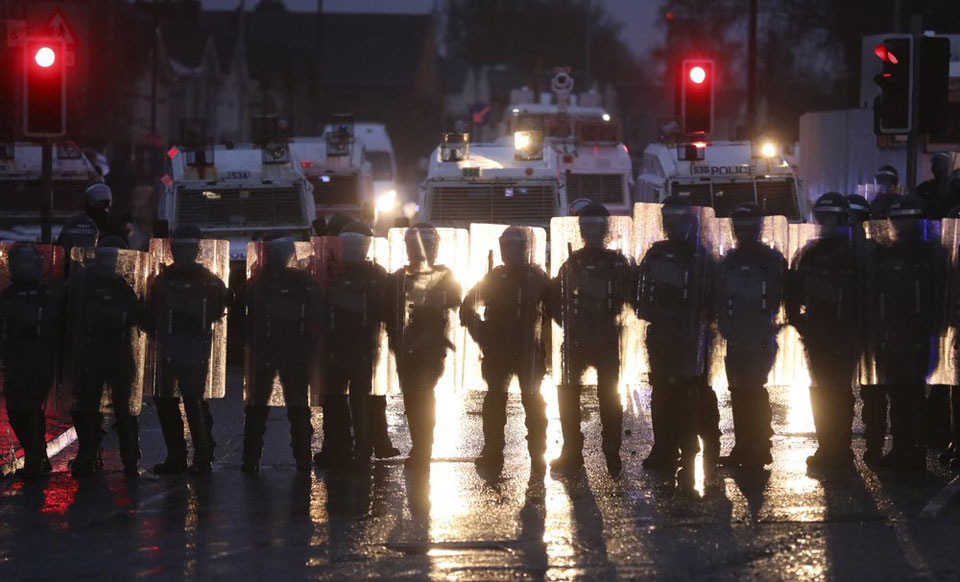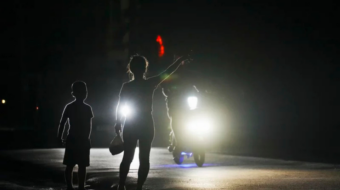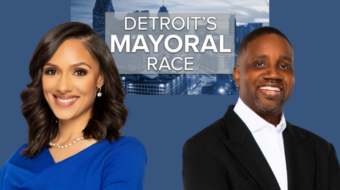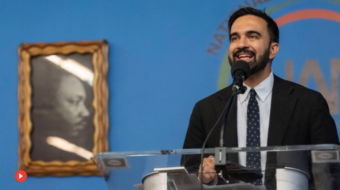
BELFAST, Northern Ireland—The smell of petrol, burning rubber, and the dull thuds of brick against police riot shield walls have marred the streets across five cities and towns in Northern Ireland for over a week. Union loyalists and Irish Republicans have clashed with police, and the rioting has often involved children as young as 12, creating scenes of violence not seen in decades—since the peak of the “troubles” in the 1970s.
On Wednesday, April 7, a double-decker bus was firebombed. The violence upon the streets of Belfast spilled over into Thursday, April 8, and marked the seventh night of violence in the loyalist areas of Carrickfergus, Newtownabbey, Londonderry/Derry, and Ballymena.
The sectarian fighting escalated by the west Belfast peace wall, dividing the predominantly Protestant loyalist communities from the Catholic nationalist communities who call for a united Republic of Ireland.
The death of Prince Phillip the Duke of Edinburgh, Friday, April 9, and the 23rd anniversary of the Good Friday Agreement—ushering in an era of uneasy and fragile peace between Loyalists and Irish Republicans—on Saturday, April 10, were the first two nights without incidents. Some minor disturbances did occur hours after the formal death announcement.
While all major political parties in Northern Ireland have called for “an immediate and complete end” to the violence, they remain divided about its causes. The Labour Party’s shadow Northern Ireland secretary said the riots have grown out of a “vacuum” created by Prime Minister Boris Johnson’s (lack of) leadership, and the tensions caused by his Brexit deal.
“I think it’s undeniable that loyalist paramilitary gangs are exploiting the tensions but they are tapping into a deep hurt and anger in the loyalist and unionist community in Northern Ireland as a consequence of the prime minister’s repeated dishonesty of the consequences of his Brexit deal,” said Louise Haigh, NI shadow secretary during an interview on BBC Radio 4’s Today.
She continued to say Johnson should “show responsibility as a custodian of the Belfast Good Friday agreement” and “convene talks with all the Northern Ireland parties” to “find political, pragmatic solutions to the tensions we are seeing.”
President Joe Biden weighed in last week and called for calm whilst voicing the administration support for the Brexit protocol.
“We are concerned by the violence in Northern Ireland, and we join the British, Irish, and Northern Irish leaders in their calls for calm,” said White House press secretary Jen Psaki during a press briefing on April 8.
“We remain, steadfast supporters of a secure and prosperous Northern Ireland, in which all communities have a voice and enjoy the gains of the hard-won peace. We welcome the provisions in both the EU-UK trade cooperation agreement and the Northern Ireland Protocol, which helped protect the gains of the Belfast/Good Friday Agreement.”
As of Monday morning, the Prime Minister has signaled there is consideration of intergovernmental talks over the rising tensions in Northern Ireland, despite concerns that involving Dublin would spark further unionist anger. Johnson has not ruled out traveling to Belfast, but any visit will be delayed until the end of the official mourning period for the Duke of Edinburgh.
Causes of Violence
- Brexit: Union loyalists in Northern Ireland are angry that the UK’s post-Brexit treaty with the European Union has created barriers between itself and the rest of Britain. The controversial protocol, known as the Northern Ireland Protocol, established a new regulatory border between Northern Ireland and the rest of the UK by keeping Northern Ireland in the EU single market and forcing checks on food and goods between Europe, the UK, and Northern Ireland causing delays and supply shortages.
The border has instilled a sense of betrayal in unionists. Naomi Long, Northern Ireland’s justice minister, directly accused Boris Johnson of “dishonesty” over the border and said it had contributed to loyalist anger.
- Sinn Fein funeral: Anger has grown over the announcement by prosecutors last week that no action would be taken against 24 Sinn Fein politicians, including deputy First Minister Michelle O’Neill, who broke coronavirus lockdown measures, along with 2,000 other people, while attending the funeral of former Irish Republican Army leader Bobby Storey, last June.
For loyalists, it’s perceived confirmation that the state institutions give preferential treatment to republicans. The Northern Ireland Assembly, Stormont, has censured Sinn Fein for attending the funeral.
- Organized Crime: In several loyalist working-class neighborhoods, the influence of paramilitary gangs still lingers. The Police Service of Northern Ireland believes paramilitary involvement is less motivated by Brexit and the funeral and has more to do with rouge factions, the South East Antrim UDA, reacting to police crackdowns on its criminal enterprise. Many of the rioters in recent days have been youths, leading to fears that they are being organized by these criminal groups.
“My concern would be young people being groomed into paramilitary organizations and criminal gangs,” said Fr. Martin Magill, a parish priest near west Belfast, “there are serious safeguarding questions to be raised.”










